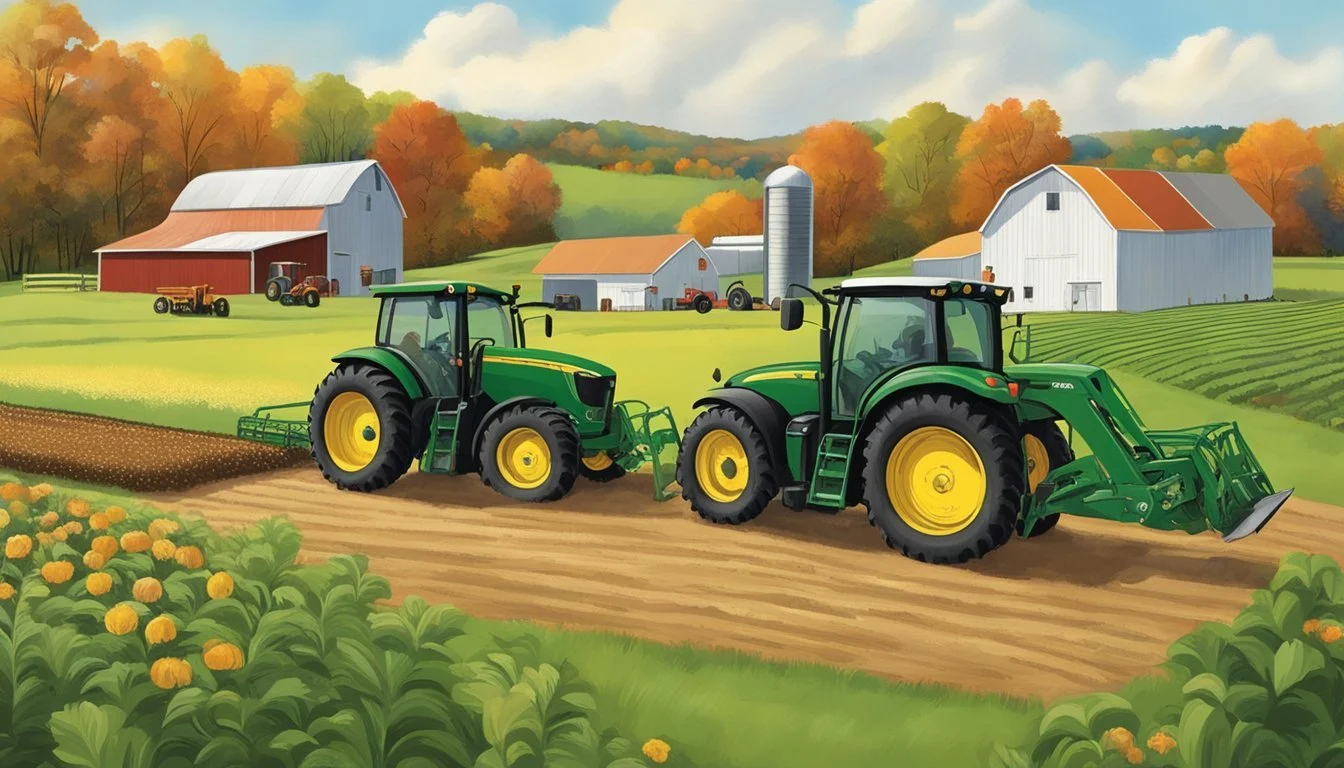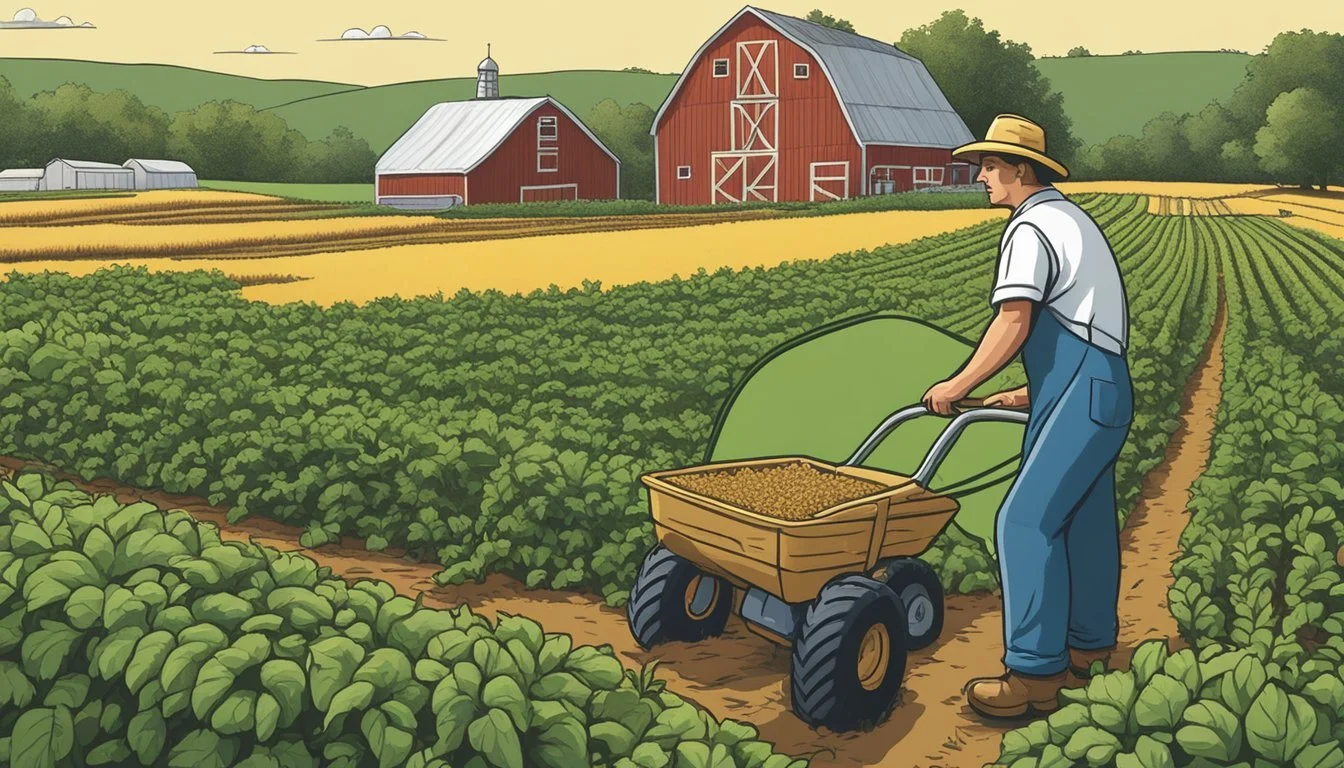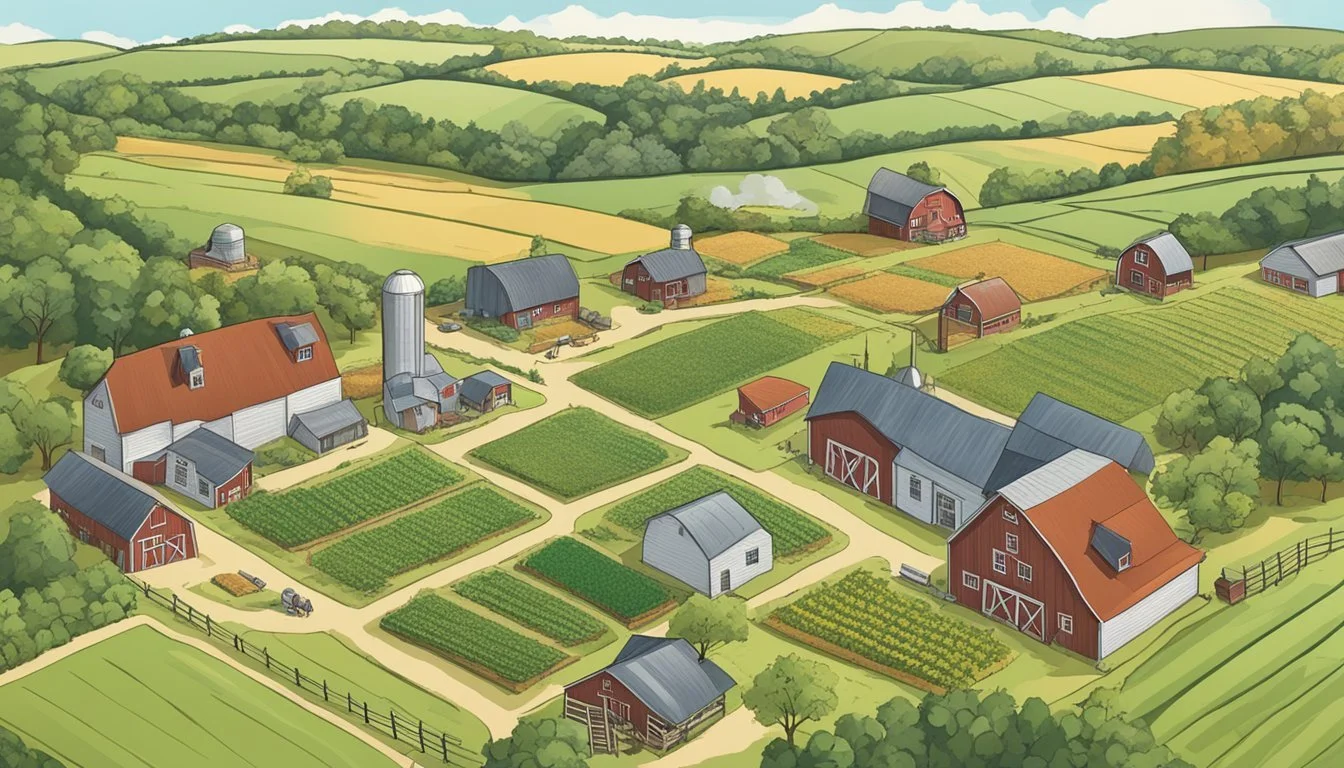Right to Farm Law in Connecticut
Understanding Agricultural Protections
The Right to Farm Law in Connecticut is a piece of legislation that has crucial implications for agricultural practices within the state. It establishes legal protections for farmers by ensuring that agricultural and farming operations are not deemed a nuisance under certain exceptions—this includes safeguarding traditional farming activities from being negatively impacted by nuisance laws, regulations, or ordinances. These guidelines typically address common by-products of farming such as odors, noises, and more. The goal of this law is to support and preserve the viability of farming activities and the agricultural environment in Connecticut.
In Connecticut, a state known for its vibrant agricultural sector, this law serves as a safeguard against the encroachment
Foundation of Right to Farm Law
Connecticut's Right to Farm Law is rooted in the state's historical development and is codified to protect agricultural practices within certain parameters. The law is pivotal in both defining agricultural operations and shielding them from specific nuisance complaints.
Historical Background
Connecticut’s expansion of rural areas and the consequent interface between agricultural and non-farming communities led to the enactment of the Right to Farm Law in 1981. This legislative move was aimed at safeguarding farmers from the burgeoning number of conflicts arising with new non-agricultural residents and businesses moving into traditionally farming-dominant areas. With farm operations receiving increasing complaints, the need for a balance between farm preservation and urban expansion became apparent.
Definition and Scope
The Right to Farm Law in Connecticut provides a broad definition of agriculture which includes farming in all its branches. This incorporates the cultivation of the soil, horticulture, forestry, dairy farming, livestock raising, and more. With this definition at its core, the law specifically designs a framework that protects established farms operating with generally accepted practices from certain regulatory actions, particularly nuisance complaints related to odor, noise, and other farming by-products.
Connecticut General Statutes
The essence of this Law is encapsulated in Section 19a-341 of the Connecticut General Statutes. This section states that an agricultural or farming operation is not to be deemed as a nuisance, given it adheres to specified conditions and follows generally accepted agricultural practices. The status provided by this statute effectively exempts qualifying farms from a range of nuisance laws, regulations, and ordinances that could otherwise hinder their operations. Connecticut laws and regulations, through this statute, thus offer a level of security and predictability for the agricultural community.
Key Provisions and Protections
Connecticut's Right to Farm Law establishes specific statutes to protect the agricultural operations from being deemed a nuisance. This legal infrastructure sets clear expectations and safeguards for farmers and neighboring communities.
Nuisance Protections
Under the Right to Farm Law, farming operations in Connecticut are shielded against nuisance claims stemming from odors, noise, and other by-products typically associated with farming, such as dust. These protections apply provided the farm adheres to generally accepted agricultural practices.
Exemption from Certain Ordinances
Agricultural activities are exempt from certain local regulations and ordinances that conflict with farming operations' right to carry out regular production. The law preempts local bodies from enacting regulations that would unjustly impede farming activities, particularly in the areas of odor, noise, and other farm-related outputs.
Accepted Management Practices
Connecticut farmers are encouraged to adhere to generally accepted agricultural practices, which include the management of manure, controlling water pollution, and use of farm equipment. These practices are crucial for maintaining their protected status under the Right to Farm Law, as long as they meet the state's established standards for proper farm operation.
Legal Framework and Enforcement
The legal framework surrounding the Right to Farm Law in Connecticut establishes a balance between agricultural practices and local zoning regulations, while enforcement roles are divided between municipalities and the Commissioner of Agriculture. This framework seeks to protect farming operations from nuisance-based interference.
Local Zoning and State Law
In Connecticut, state law provides guidelines that override local zoning laws in the context of agriculture. Connecticut General Statutes specifically stipulate that agricultural operations cannot be considered a nuisance if they adhere to generally accepted practices, even if local ordinances or regulations are to the contrary. These provisions are designed to protect farms from the encroachment of suburban development and complaints that could arise due to normal farm operations. They ensure that farming activities, including the associated odors, noises, and other by-products, do not fall victim to nuisance lawsuits purely based on their nature as agricultural enterprises.
Roles of Municipalities and the Commissioner of Agriculture
While the state law lays the groundwork, the enforcement and interpretation of the Right to Farm statutes involve both local municipalities and the Commissioner of Agriculture. Municipalities are responsible for implementing right-to-farm ordinances that line up with state statutes, while the Commissioner of Agriculture acts as a liaison and authoritative figure in resolving disputes that may arise. The Commissioner's role includes:
Reviewing complaints against farm operations.
Determining the applicability of the Right to Farm Law.
Ensuring that farms are following generally accepted agricultural practices.
The cooperation between municipalities and the Commissioner helps to maintain a viable agricultural sector in Connecticut, providing a layer of protection for farms against undue interference while respecting local zoning circumstances.
Operational Guidelines for Farmers
In accordance with Connecticut's Right to Farm Law, farmers are expected to adhere to established guidelines that are critical for maintaining the balance between farm operation practices and regulatory compliance. These guidelines ensure that agricultural activities coexist with local laws and community standards.
Livestock and Crop Production
Farmers managing livestock should conduct operations in a manner that follows generally accepted agricultural practices. This includes providing proper housing, feed, and care for the animals to ensure their well-being and to minimize potential nuisances such as odors and noise that may affect the surrounding community.
For crop production, farmers are responsible for implementing suitable methods for soil preparation, planting, and harvesting. Practices like plowing and crop rotation are important in maintaining soil health and productivity. Farmers should also ensure that any changes to their farming operations do not substantially alter the character of their business, thereby staying in alignment with the Right to Farm provisions.
Chemical and Equipment Use
When it comes to the application of chemicals and fertilizers, farmers must judiciously manage their use to protect local ecosystems. They should adhere to the recommended application rates and timings to minimize any run-off that could lead to environmental contamination.
Fertilizer: Utilize as per manufacturer's recommended guidelines; keep records of application schedules.
Pesticides: Apply only approved chemicals; follow safety protocols for storage and handling.
Regarding farm equipment, maintenance and operation should not pose a threat to public safety or cause undue disturbance. Equipment should be kept in good repair to prevent accidents and should be used in compliance with noise regulations.
Machinery: Regular maintenance should be conducted; use during recommended hours to reduce noise impact.
Challenges and Controversies
Right to Farm laws in Connecticut are designed to support farming activities, yet they encounter challenges and controversies, especially related to public health and safety, and environmental impact.
Public Health and Safety
Right to Farm laws allow agricultural activities to proceed with certain exemptions from nuisance laws. However, the production of odor from livestock, manure, and fertilizers, along with noise from farm equipment, can be a significant nuisance to nearby residents. These issues might affect public health, particularly in scenarios where the intensity of these nuisances crosses thresholds of tolerability or encroaches upon residential areas.
Noise: Can disrupt local communities and impact quality of life.
Odor: May lead to complaints and concerns regarding air quality.
Environmental and Pollution Concerns
Environmental challenges arise when farming practices, shielded by the Right to Farm Law, inadvertently contribute to pollution. This includes contamination of water supplies due to runoff from fields treated with pesticides and fertilizers.
Pesticides and Fertilizers: Potential to affect local drinking water supplies.
Runoff: Can carry pollutants into water bodies, impacting local ecosystems.
The management and regulation of such substances are crucial to mitigate their environmental impact. While the law promotes the growth of farming activities, the balance between agricultural expansion and environmental sustainability remains a controversial aspect of Connecticut's Right to Farm Law.
Implications and Case Studies
The Right to Farm laws in Connecticut have significant implications for legal disputes and the social dynamics within local communities. Often at the heart of these are issues of nuisance, negligence, and the balance of agricultural needs with residential concerns. These laws come into play within jurisdictional debates and have also been pivotal in several lawsuits concerning farming practices.
Legal Disputes and Case Law
In Connecticut, the Right to Farm Law has been a central piece of legislation in cases where farming operations are charged with being a nuisance. Pestey v. Cushman is a notable case in the state, where the Supreme Court's decision had broader implications for the enforcement of the Right to Farm Law. Distinctions in such cases may hinge upon whether farming actions were negligent, reckless, or involved willful misconduct.
Negligence: Generally not protected by Right to Farm Laws if it's proven.
Reckless Misconduct: May lead to liability if the conduct unreasonably interfered with others' rights.
Willful Actions: Protection from nuisance lawsuits does not entirely absolve willful farm operations from legal recompense.
Furthermore, the jurisdiction plays a crucial role as the case law contributes to defining the limits and applications of the Right to Farm laws within the state.
Impact on Local Communities
The effects of these laws ripple through local communities. The law intends to protect existing and established farms from being deemed nuisances due to the ordinary side effects of farming, such as:
Odors: From livestock, manure, fertilizer, or feed.
Noise: From machinery or livestock as part of standard farming practices.
Claims of unreasonable interference or damages from farming activities must be carefully weighed against the protections afforded by the Right to Farm Law. While intended to safeguard farming operations, these laws also define the threshold for when such activities cross into the realm of public nuisance or potential harm to communities. As the number of farm operations grows and urban boundaries expand, the interplay between farms and residential areas becomes more pronounced, often requiring legal interpretation to resolve conflicts.
Economic and Tax Implications
Connecticut's Right to Farm Laws have clear economic and tax implications affecting property owners and state revenue. They are designed to support agricultural activities through tax benefits and to contribute to farmland preservation.
Tax Exemptions and Farmland Preservation
Tax Exemptions: Farmers in Connecticut can benefit from sales and use tax exemptions on certain purchases. Under Connecticut General Statutes, Section 19a-341, agricultural operations are shielded from various forms of sales tax, providing them with a significant economic advantage. This incentive is crucial for the viability and competitiveness of farms within the state.
Farmland Preservation: Connecticut's Public Act 490 allows farmers to have their land assessed at its current use value rather than its potential development value. This program, endorsed by the American Farmland Trust, is instrumental in preserving agricultural land by making it financially viable for farmers to retain ownership. By reducing the assessed value of farmland, farmers are subject to lower property taxes, which benefits their economic stability and deters the conversion of farmland to non-agricultural uses.
Revenue and Property Tax Considerations
Revenue: Tax exemptions for farmers mean that the state collects less revenue in the short term from sales and property taxes. However, by encouraging the business of farming, these laws aim to secure long-term economic vitality through a sustained agricultural sector.
Property Tax: The difference between the market value and the assessed value under Public Act 490 may reduce the property tax burden for farmers. However, it also impacts the revenue that municipalities can collect from these properties. This reduction in revenue must be balanced with the broader goal of maintaining farmland for agricultural use, which supports the rural character and agricultural economy of the state.
Broader Agricultural Policies
The broader agricultural policies of Connecticut support agricultural operations, ensuring their alignment with environmental protection and adherence to Connecticut General Statutes.
Connecticut Department of Agriculture
The Connecticut Department of Agriculture plays a pivotal role in formulating policies that foster a healthy relationship between agriculture and the environment. It oversees agricultural operations, ensuring they comply with environmental regulations. The department also supports farms in maintaining generally accepted agricultural practices as stated in the state's Right to Farm law.
Federal and State Legislation Alignment
Connecticut's agricultural policies are designed to align with federal legislation while catering to the specific needs of the state's diverse agricultural sectors. Through coordination with federal bodies and adherence to the Connecticut General Statutes, the state facilitates a framework where agriculture thrives while abiding by environmental and safety standards. Legislation affecting agriculture in Connecticut is routinely reviewed to maintain this alignment and to address emerging issues in the sector.









